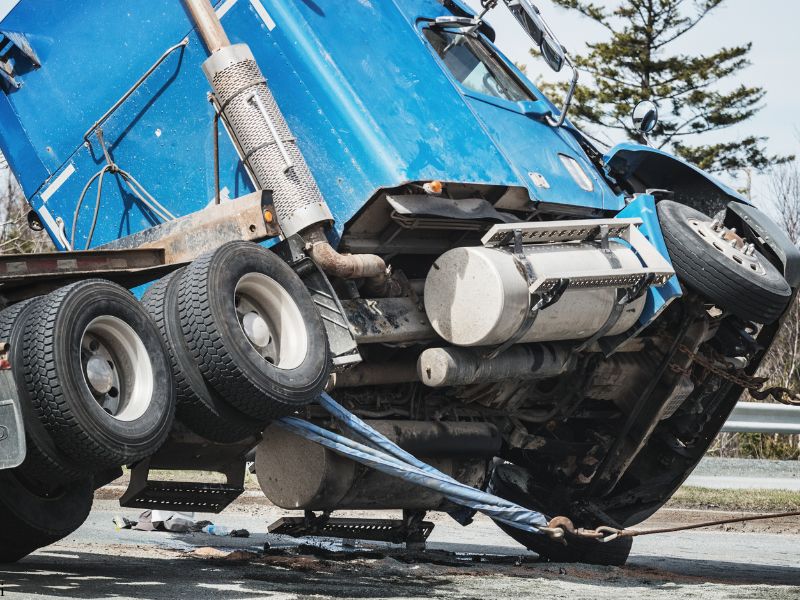Whether you’re hauling short distances or across the country, understanding your options and the types of coverage available is essential for smooth operations and peace of mind.
Types of Truck Insurance

To protect your trucking business and meet legal and contractual requirements, you need the right combination of coverage options. Below are the most common types of insurance for truckers:
Physical Damage Insurance
Trucks face numerous risks on the road, from accidents and severe weather to vandalism and theft. Physical damage insurance ensures that your vehicle is covered for repairs or replacement. With this coverage, you can feel confident that your truck is protected wherever your journey takes you.
General Liability Insurance
Trucking businesses operate in a world where lawsuits are increasingly common. General liability insurance covers property damage or injuries you may cause during business activities not directly related to operating your truck. For example, it provides protection if:
- You deliver a load to the wrong location.
- A driver accidentally damages third-party property.
- A driver is accused of slander or libel.
This insurance also covers legal fees, which can quickly add up during lawsuits.
Non-Trucking Liability Insurance
If you use your business truck for personal errands, non-trucking liability insurance provides coverage for accidents that occur while the truck is not being used for business purposes.
Bobtail Insurance
When a truck is operated without a trailer (also known as bobtailing), bobtail insurance is essential. It differs from non-trucking liability insurance and is often required by motor carriers for owner-operators.
Medical Payments Insurance
Medical payment insurance covers medical expenses for you and your passengers if you’re injured in an accident. This ensures that you’re not burdened with high out-of-pocket costs after an unforeseen incident.
Motor Truck Cargo Insurance
This coverage protects the freight or commodities you transport. If cargo is damaged, lost, or requires cleanup after an accident, motor truck cargo insurance steps in. It’s often required by shippers and brokers and can even cover lost earnings if a delivery is not completed.
Is Truck Insurance Required?

Yes, truck insurance is required by law in the U.S., with minimum coverage limits set by the Federal Motor Carrier Safety Administration (FMCSA). These requirements vary based on the type of cargo you haul and the weight of your truck.
- Non-Hazardous Cargo: A minimum of $750,000 in liability coverage is required for trucks over 10,001 pounds crossing state lines.
- Hazardous Materials: Transporting hazardous materials requires a minimum coverage of $5 million, regardless of truck weight.
It’s important to note that these are only the legal minimums. Many contracts with shippers and brokers require higher limits to ensure adequate protection.
How Much Does a Truck Insurance Quote Cost?
The cost of truck insurance varies widely depending on factors such as:
- Driving Record: A clean record results in lower premiums.
- Truck Type: Newer, more expensive trucks cost more to insure.
- Cargo Type: Hauling hazardous or high-value materials increases insurance costs.
- Area of Operation: Operating in high-risk regions may lead to higher premiums.
- Coverage Levels: Bundling policies can lower costs, while individual coverages tend to be more expensive.
Here’s a general breakdown of truck insurance costs:
- Leased Owner-Operators: Approximately $1,600 per year for basic coverage.
- Tractor-Trailer Insurance: Around $3,000 per year, depending on the truck type and cargo.
- Owner-Operators with Authority: Average costs can range up to $10,000 annually due to increased coverage needs.

How to Get the Right Truck Insurance Quote
Getting an accurate truck insurance quote is a straightforward process. Here’s what you’ll need:
- Truck Details: Provide information about the make, model, and value of your truck.
- Driving History: Share details about your driving record to determine your risk profile.
- Cargo Information: Specify the type of goods you transport.
- Coverage Requirements: Let the agent know if you need additional coverage beyond FMCSA minimums.
Once you’ve gathered this information, contact an experienced agent at FarmerBrown.com. In just a few minutes, you’ll receive a customized quote that fits your budget and coverage needs.
Why Comprehensive Coverage Matters
While meeting legal requirements is essential, having additional coverage can protect your business from significant financial loss. Accidents, lawsuits, and cargo damage are costly, but a well-structured insurance policy ensures you’re not caught off guard.
Investing in the right truck insurance not only safeguards your livelihood but also gives you peace of mind to focus on running your business.
Conclusion
Ready to protect your trucking business? Don’t wait—get your truck insurance quote today and drive with confidence.
